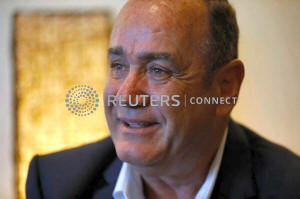Exclusive: Guatemala election winner hopes to change Trump migrant deal
 Send a link to a friend
Send a link to a friend
 [August 12, 2019]
By Sofia Menchu and Diego Oré [August 12, 2019]
By Sofia Menchu and Diego Oré
GUATEMALA CITY (Reuters) - The winner of
Guatemala's presidential election, Alejandro Giammattei, said on Sunday
he hoped he could make changes to a controversial migration deal the
Central American country signed with the Trump administration last
month.
Speaking to Reuters shortly before being declared victor, the
conservative Giammattei said he wanted to see what could be done to
improve the deal that outgoing President Jimmy Morales agreed to stem
U.S.-bound migration from Central America.
Giammattei will not take office until January, by which time Guatemala
may be under severe pressure from the deal that effectively turns the
country into a buffer zone, by forcing migrants to seek refuge there
rather than in the United States.
"I hope that during this transition the doors will open to get more
information so we can see what, from a diplomatic point of view, we can
do to remove from this deal the things that are not right for us, or how
we can come to an agreement with the United States," Giammattei, 63,
said in the interview.

Threatened with economic sanctions if he said no, Morales reached an
accord in late July to make Guatemala a so-called safe third country for
migrants, despite the endemic poverty and violence plaguing the Central
American nation.
"It's not right for the country," Giammattei said of the deal. "If we
don't have the capacity to look after our own people, imagine what it
will be like for foreigners."
The agreement is also highly unpopular in Guatemala.
A poll published this week by Guatemalan newspaper Prensa Libre showed
more than eight out of 10 respondents rejected the idea of the country
accepting foreign migrants seeking asylum.
Giammattei noted that since a U.S. judge had already suspended a
separate safe third country accord, there was a chance that the deal
with Guatemala could change.
"We'll have to see what happens in the United States with the federal
judge's decision. The most likely outcome is that the United States will
have to modify ... the deal," he said, also noting Guatemala's Congress
would need to be consulted.
[to top of second column]
|

The winner of Guatemala's presidential election, Alejandro
Giammattei, talks during an interview with Reuters in Guatemala
City, Guatemala, August 11, 2019. REUTERS/Jose Cabezas

In July, a U.S. federal judge in California blocked a Trump
administration rule that would bar asylum applications at the
U.S.-Mexico border.
Prior to the accord president Morales signed, Guatemala's
Constitutional Court said Congress, which is in recess, needed to be
consulted on any safe third country deal.
But when Trump threatened to impose tariffs on Guatemalan exports,
and to levy charges on billions of dollars in remittances sent home
by Guatemalans living in the United States if he failed to sign the
migration deal, Morales relented.
Three million Guatemalans live and work in the United States, which
is also the country's main trading partner.
Giammattei also said he doubted that migrants would be willing to
comply with the deal.
"They are looking for asylum in the United States," he said. "I
don't think there are a lot of people from El Salvador and Honduras
who want to seek asylum in Guatemala, especially if they are fleeing
poverty."
To address the migration problem, Giammattei has pledged to build a
"wall of investment" along Guatemala's impoverished border region
with Mexico as a means of promoting economic development and
encouraging people to stay at home.
Giammattei, a veteran bureaucrat, had lost his three previous bids
for the presidency.
But he defeated his center-left rival, former first lady Sandra
Torres, by a landslide, winning more than 58% of the vote,
preliminary results showed.

(Reporting by Sofia Menchu and Diego Oré; Writing by Stefanie
Eschenbacher and Delphine Schrank; Editing by Dave Graham and
Stephen Coates)
[© 2019 Thomson Reuters. All rights
reserved.]
Copyright 2019 Reuters. All rights reserved. This material may not be published,
broadcast, rewritten or redistributed.
Thompson Reuters is solely responsible for this content. |